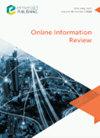The complex information needs of Chinese parents of children with autism spectrum disorder
IF 3.1
3区 管理学
Q2 COMPUTER SCIENCE, INFORMATION SYSTEMS
引用次数: 0
Abstract
Purpose This study aims to explore the information needs of Chinese parents of children with Autism Spectrum Disorder (ASD) and how these needs evolve as their children develop. Design/methodology/approach This study collated 17,122 questions regarding raising children with ASD via the Yi Lin website until November 2021. Findings The information needs of parents of children with ASD were classified into two categories: 1) Cognition-motivation: related to children with ASD; and 2) Affection-motivation: related to their parents. Child development causes the adaptation of information needs of these parents. Within the first three years, nine different topics of these parents' information needs were identified. Major information needs at this stage are as follows: intervention content, intervention methods and pre-diagnosis questions. During the ages of three to six years, there were 13 topics of information needs for parents, focusing on three areas: intervention content, intervention methods and diagnosis and examination. There are eight topics of information needs post six years. Parents are more concerned with the three topics of intervention content, life planning and intervention methods. Originality/value This novel study indicates the complex and changing information needs of parents of children with ASD in China. It may enhance the understanding of the information needs of these parents at theoretical and practical levels, provide support for them to understand their own information needs and provide a reference for relevant government and social organisations to provide targeted information services for them. Peer review The peer review history for this article is available at: https://publons.com/publon/10.1108/OIR-04-2022-0247中国自闭症谱系障碍儿童家长的复杂信息需求
目的探讨中国自闭症谱系障碍(ASD)儿童家长的信息需求及其随儿童发育的变化趋势。设计/方法/方法本研究通过易林网站整理了17122个关于抚养ASD儿童的问题,直至2021年11月。发现自闭症儿童家长的信息需求分为两类:1)认知-动机:与自闭症儿童相关;2)情感动机:与父母有关。儿童的发展导致了这些父母对信息需求的适应。在最初的三年里,这些父母的信息需求被确定为九个不同的主题。本阶段的主要信息需求有:干预内容、干预方法和诊断前问题。在3 ~ 6岁期间,父母信息需求的主题有13个,主要集中在干预内容、干预方法和诊断与检查三个方面。有八个主题的信息需求后六年。家长更关注干预内容、生活规划和干预方法三个主题。独创性/价值这一新颖的研究表明,中国自闭症儿童家长的信息需求复杂多变。它可以在理论和实践层面增强对这些家长的信息需求的认识,为他们了解自己的信息需求提供支持,并为相关政府和社会机构提供有针对性的信息服务提供参考。同行评议本文的同行评议历史可在:https://publons.com/publon/10.1108/OIR-04-2022-0247
本文章由计算机程序翻译,如有差异,请以英文原文为准。
求助全文
约1分钟内获得全文
求助全文
来源期刊

Online Information Review
工程技术-计算机:信息系统
CiteScore
6.90
自引率
16.10%
发文量
67
审稿时长
6 months
期刊介绍:
The journal provides a multi-disciplinary forum for scholars from a range of fields, including information studies/iSchools, data studies, internet studies, media and communication studies and information systems.
Publishes research on the social, political and ethical aspects of emergent digital information practices and platforms, and welcomes submissions that draw upon critical and socio-technical perspectives in order to address these developments.
Welcomes empirical, conceptual and methodological contributions on any topics relevant to the broad field of digital information and communication, however we are particularly interested in receiving submissions that address emerging issues around the below topics.
Coverage includes (but is not limited to):
•Online communities, social networking and social media, including online political communication; crowdsourcing; positive computing and wellbeing.
•The social drivers and implications of emerging data practices, including open data; big data; data journeys and flows; and research data management.
•Digital transformations including organisations’ use of information technologies (e.g. Internet of Things and digitisation of user experience) to improve economic and social welfare, health and wellbeing, and protect the environment.
•Developments in digital scholarship and the production and use of scholarly content.
•Online and digital research methods, including their ethical aspects.
 求助内容:
求助内容: 应助结果提醒方式:
应助结果提醒方式:


